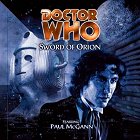 In the wake of the events surrounding the crash of the R-101, the Doctor and Charley take in a stray time vortex-dwelling creature, which Charley names “Ramsay.” But when Ramsay falls ill, the Doctor steers the TARDIS toward the Garazone system, where he hopes to find a cure. But the Doctor’s stopover at Garazone launches him into an even more perilous adventure. The scrap ship Vanguard is preparing to depart under the command of a mysterious new captain, and the Doctor and Charley are forced to stow away when the TARDIS is mistakenly loaded into the Vanguard’s cargo bay. Matters are made worse when the Vanguard makes a bee-line for a hulking derelict spacecraft. The Doctor and Charley watch helplessly as the crew try to board the enormous ship, and then one by one begin falling victim to that ship’s population of Cybermen, who have received a signal to reactive. But a danger greater than Cybermen may be lurking among the Vanguard’s crew – a danger which threatens the future of the entire human race.
In the wake of the events surrounding the crash of the R-101, the Doctor and Charley take in a stray time vortex-dwelling creature, which Charley names “Ramsay.” But when Ramsay falls ill, the Doctor steers the TARDIS toward the Garazone system, where he hopes to find a cure. But the Doctor’s stopover at Garazone launches him into an even more perilous adventure. The scrap ship Vanguard is preparing to depart under the command of a mysterious new captain, and the Doctor and Charley are forced to stow away when the TARDIS is mistakenly loaded into the Vanguard’s cargo bay. Matters are made worse when the Vanguard makes a bee-line for a hulking derelict spacecraft. The Doctor and Charley watch helplessly as the crew try to board the enormous ship, and then one by one begin falling victim to that ship’s population of Cybermen, who have received a signal to reactive. But a danger greater than Cybermen may be lurking among the Vanguard’s crew – a danger which threatens the future of the entire human race.
written by Nicholas Briggs
directed by Nicholas Briggs
music by Nicholas BriggsCast: Paul McGann (The Doctor), India Fisher (Charley), Michelle Livingstone (Deeva), Bruce Montague (Grash), Helen Goldwyn (Chev), Ian Marr (Ike), Hylton Collins (Vol), Toby Longworth (Kelsey)
Timeline: after Storm Warning and before Stones Of Venice
LogBook entry and TheatEar review by Earl Green
Review: Sword Of Orion has all the hallmarks of classic Doctor Who – a claustrophobic alien environment, a faceless menace picking off protagonists one by one in the dark, and a few so-called protagonists who probably deserve to be offers but are nevertheless characters the audience grows to sympathize with to some extent. And, of course, another prerequisite of this scenario is that nobody trusts the Doctor.
Despite the cover art’s use of the late 60s/1970s Cybermen, as seen in such TV stories as The Invasion and Revenge Of The Cybermen, I pictured the Cybermen of the 1980s throughout this story, as that was the voice treatment used for them. Despite their use of Cybermats and mind control, they sounded like John Nathan-Turner-era Cybermen to me. But that’s irrelevant. In whatever costume they appear, these were the Cybermen of old: hiding in great numbers, awaiting unsuspecting passers-by (though not all of the Vanguard’s crew were completely in the dark about the contents of the massive ship), and taking out any potential resistance one at a time.
However, in this well-constructed four-parter by Nick Briggs, the Cybermen are set dressing – a distraction from the real story. Ironically, Sword Of Orion hails from Briggs’ amateur-produced audio cassette series of Audio-Visuals in the mid-1980s, also the source of last year’s disappointing Dalek epic The Mutant Phase. But unlike that story, Sword moves along relentlessly and accomplishes a rare feat: using one of Doctor Who’s most popular adversaries as a mere red herring, and obstacle en route to the real story. This isn’t to say that all four episodes aren’t crawling with Cybermen, but they are but one of a number of threats.
A uniformly outstanding cast joins Paul McGann and India Fisher for this outing, and character development is more to the fore than has been the case with some of the Big Finish Audio Adventures. So too is good old-fashioned, Agatha Christie-style mystery.
I was worried about the Eighth Doctor audio plays when they were first announced, but with each successive story I’m growing more impressed – and more hooked.
